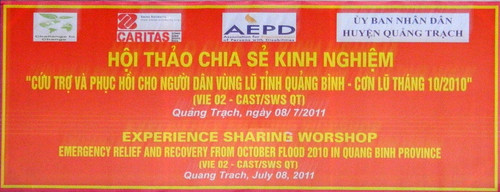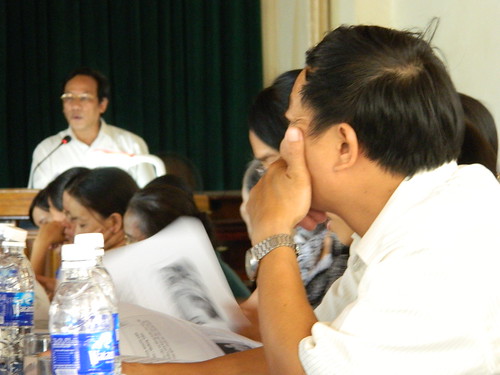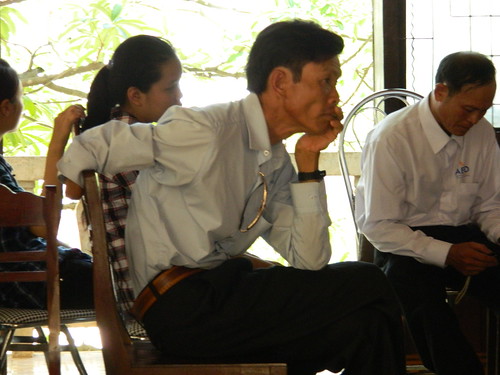By all accounts, 2010 was a terrible year. It brought us awful films like the remake of “Clash of the Titans”, the ear cringing sounds (I hesitate to use the word music) of Ke$ha, a second season of “Jersey Shore”, rising unemployment, continued wars and occupations, cats and dogs living together (Murray, Bill 1984) and the list goes on. The Mayan prophecy of 2012 seems to be right on track. As if the cultural, economic, and political downward spiral weren’t enough, it was a hellacious year of natural disasters, which also means that it was a particularly bad time for Persons with Disabilities (PWD’s), who are amongst the most vulnerable groups during these events.
Depending on what indicators you use, 2010 may go down as the worst year ever for natural disasters. Most sources cite a figure of nearly 300,000 deaths and financial costs of up to 130 billion US dollars. The earthquake in Haiti of course takes up a significant share of the casualties but there’s there were many other disasters that also contributed to these mind boggling numbers. Floods in Pakistan, blizzards in China, quakes in Chile, Russian wildfires and sub-zero temps in Peru are just a few of the 950 natural disasters from 2010. Somewhat lost amongst all these events were the historic floods that wreaked havoc on central Vietnam during October of last year. Flooding is simply a part of life for those who live on the coast and central highlands of Vietnam, but the severity and erratic patterns have caused great concern for the region, forcing communities to become more aware of climate change issues and how it affects their lives.
The floods of October 2010 mostly affected Quang Binh province, which is where AEPD is headquartered. Total deaths are unknown but the figure most often reported is around 80 with some dozens still missing and presumed dead. Quang Binh took the brunt of the storm with 45 deaths and over 100,000 homes submerged in water. Moreover, entire fields of rice and other crops were swept away in the flood water, crippling the base of the region’s economy. Further complicating the issue is the disproportionately high level of PWD’s in the area, which account for nearly 5% of the province’s total population. Along with the elderly, PWD’s have greater risks than others during disasters like flooding. For those in the US, we need only to look at our experience during Hurricane Katrina as proof. Paralyzed civilians were left behind, nursing homes were deserted, and the overall lack of planning and coordination concerning this vulnerable community was unfortunately brought to light. Check out this article from CNN for an overview of the problem.
Emergency relief after natural disasters is not an easy endeavor. Many times resources aren’t mobilized fast enough, are misallocated, or wasted. There’s also an oversaturation issue. There are simply too many cooks in the kitchen, dispensing either unneeded or impractical relief, like during the tornadoes in Alabama earlier this year when broken toys and used underwear were donated from across the country Yes, this actually happens. check it out here. The world simply hasn’t quite perfected emergency relief quite yet. Here in Quang Binh however, I’m seeing a level of coordination in response to natural disasters that makes me a little envious. If enough people comment on this post, maybe we can persuade some of them to work for FEMA.
AEPD Disaster Relief Movie Part 1
AEPD Disaster Relief Movie Part 2
Recognizing that a large sector of the community wasn’t benefiting from the various relief programs provided by the government and NGO’s, AEPD partnered with Caritas Switzerland, Challenge to Change (a UK NGO) and various authorities from the communal and district authorities. Caritas was very smart to seek out AEPD. They’ve been working with the PWD community for over 7 years now in Quang Binh, and have their fingers on the pulse of the PWD community. They knew exactly where most of the PWD’s lived and what types of assistance they’d actually need. They also have some of the most professional and dedicated staff in the area, as their team of outreach workers constantly had their boots on the ground, evaluating and monitoring the execution of the project. AEPD was constantly in contact with Caritas who funded the project, as well as various local government departments ensuring distribution of aid was efficient. When it was all said and done, 16 tons of rice and 400 kg of dry fish were given out to 860 needy households in 3 different communes. It also provided 250kg of seed and 75 tons of fertilizer to produce crops on 50 hectares of land, which is enough to support the dietary needs of nearly 1800 people. The project also focused on home reconstruction, with an aim to make them more resilient in future storms. 30 homes were repaired, along with 3 heavily damaged kindergartens. For a complete overview on the storms of October 2010 and the relief project, check out part 1 and 2 of a film produced by AEPD posted above.
I had a chance to talk with many representatives from Caritas, Challenge to Change, local government personnel and the project beneficiaries themselves during an experience sharing workshop held a few weeks ago. Mr. Lan who heads the Caritas Vietnam office reaffirmed my sentiments about the project. He has ample experience in disaster relief operations and was very pleased with the outcome of the project “Access to information and coordination of different agencies is always a challenge” he told me. “Not this time though. The cohesion amongst the government and NGO’s was exemplarily and a big reason for the project’s success”. This feeling was also shared by Mr. Tran of the District Peoples Committee. “The big lesson I learned from this workshop was the value of planning. We had great criteria and beneficiary selection because we listened to the community and various organizations closely. This is something we must continue to do in the future”.
I was skeptical when I first heard that AEPD was branching out into emergency relief and climate change advocacy. I feel that when NGO’s try to take on too many projects, their core function gets diminished. After learning more about AEPD’s role in the disaster relief project however, I realized there simply isn’t a better organization around that could fit the role the project required. Caritas wanted to fund a project that helped vulnerable people after the October flood, particularly PWD’s, so AEPD was an obvious partner. Not only are they able to identify at risk individuals and raise awareness on climate change, but they have earned a stellar reputation in the community and have strong relationships with local government offices. Not every PWD is so lucky however. Try and think of your own hometown. Is there a group working to protect the vulnerable in your area in case the improbable happens? Do you think the elderly, single mothers, or PWD’s would be well provided for in case of a natural disaster? If you can’t name a group besides the Red Cross or FEMA, than perhaps your neighborhood should be taking the pre-emptive steps like the people of Quang Binh Vietnam. It’s not the most pleasant thing to think about, but failing to do so could lead to tragic outcomes.
Posted By Ryan McGovern (Vietnam)
Posted Aug 9th, 2011




